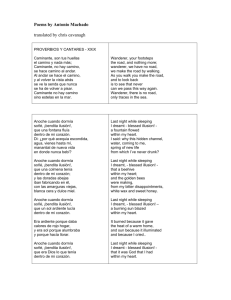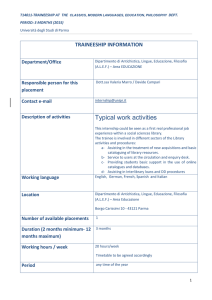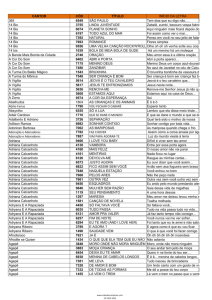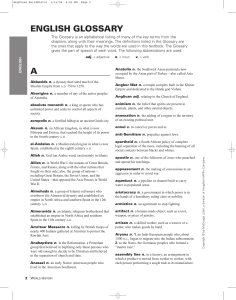On-line newspaper #3 - Istituto Comprensivo di via Scopoli
advertisement
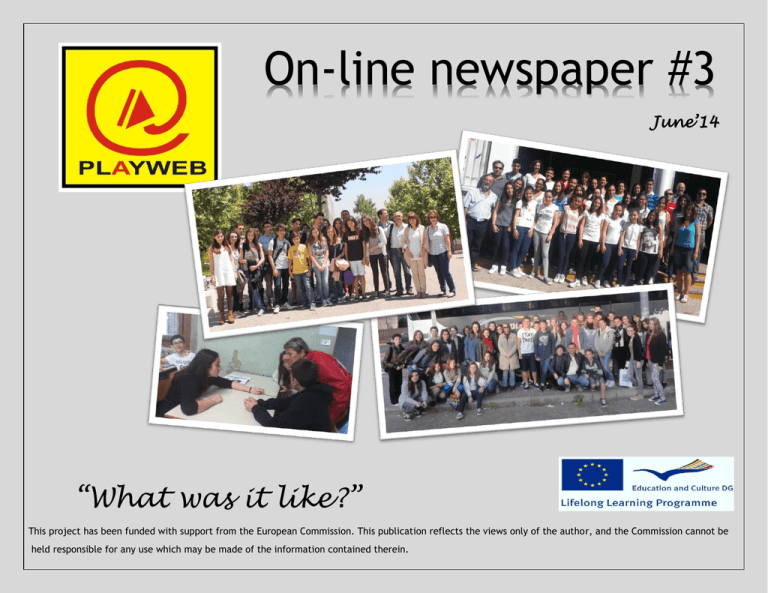
On-line newspaper #3 June’14 “What was it like?” This project has been funded with support from the European Commission. This publication reflects the views only of the author, and the Commission cannot be held responsible for any use which may be made of the information contained therein. FRENCH TEACHERS PROFESSEURS FRANÇAIS 1. Why is a cultural exchange important in a student’s education process? The exchange is very rewarding for students: it allows them to discover other cultures, other ways of living, to forge friendships but also to share their own culture. It is this combination of cultures that promotes the construction of European identity. 1. Pourquoi un échange culturel est-il important dans l’éducation de nos élèves? L’échange est très enrichissant pour les élèves : il leur permet de découvrir d’autres cultures, d’autres façons de vivre, de tisser des liens d’amitié mais aussi de partager sa propre culture. C’est ce rapprochement des cultures qui favorise la construction de l’identité européenne. Most teachers in Feillens, France At work in Italy 2. Did you meet any difficulties organizing the exchange? The main difficulty was to convince parents to open up to each other by hosting a foreign child. 2. Avez-vous rencontré des difficultés dans l’organisation de l’échange? La principale difficulté a été de convaincre les parents de s’ouvrir à l’autre en accueillant un enfant étranger. 3. What were the moments you preferred? What we preferred are the moments when we worked and exchanged: we have different working methods. The fact of working together has been very rewarding. We’ve learnt a lot from our differences. At work in Italy At work in Italy 3. Quels ont été les moments que vous avez préférés? Ce que nous avons préféré, ce sont les moments où nous avons travaillé et échangé: nous avons des méthodes de travail différentes. Le fait de travailler ensemble a été très enrichissant. Nous avons beaucoup appris de nos différences. FRENCH STUDENTS ÉLÈVES FRANÇAIS 1. What did you prefer during the exchange? What we preferred are the moments we spent with our correspondents as we discovered their school, their classrooms and how they were working. We watched our videos and we realized that we met the same problems with internet. 1. Qu’avez-vous préféré pendant l’échange ? Ce que nous avons préféré, ce sont les moments que nous avons passés avec nos correspondants car nous avons découvert leur collège, leurs classes et comment ils travaillaient. Nous avons regardé nos vidéos et nous nous sommes aperçus que nous rencontrions les mêmes problèmes avec internet. 2. What did you learn from this experience? We learnt that even though we did not have the same nationality, we had the same difficulties, the same problems, the same passions. 2. Qu’avez-vous appris de cette expérience ? Nous avons appris que même si nous n’avions pas la même nationalité, nous avions les mêmes difficultés, les mêmes problèmes, les mêmes passions. 3. Have you got any tips for future exchanges? We would like the exchanges to last longer. But we decided to meet again this summer: we will do another exchange, this time without teachers! 3. Avez-vous quelques idées pour améliorer les échanges dans le futur ? Nous aimerions que les échanges durent plus longtemps. Nous avons décidé de nous revoir cet été : nous allons refaire un échange, cette fois sans les professeurs ! ITALIAN TEACHERS INSEGNANTI ITALIANI 1. Why is a cultural exchange important in a student’s education process? Well, thanks to the exchange the students have the chance to compare directly their culture, language, civilization and meet their coevals to share emotions and life styles even if for few days. 1. Qual' è l'importanza di uno scambio culturale nel processo educativo degli studenti? Penso che attraverso lo scambio i giovani abbiano la possibilità di confrontare dal vivo cultura, lingua, civiltà, appresi dai libri di testo, e incontrare coetanei con i quali condividere anche se per pochi giorni emozioni e modi di vivere diversi ma pur sempre simili. 2. Did you meet any difficulties organizing the exchange? It isn’t easy at all to organize a students’ exchange. On this occasion the advantage was the strong inclination towards organization of my French correspondent who helped me a lot. The disadvantages, in this case, were: the age of my students, many of them had never travelled abroad without their families, bureaucracy, it is quite difficult to take kids out of Italy without parents, and last but not least the Italian school system which isn’t very flexible, so it is sometimes impossible to involve all the teachers in this activity, when it is lesson time. 2. Hai incontrato difficoltà nell'organizzazione dello scambio? Organizzare uno scambio non è un'impresa facile, tutt'altro .Il punto di forza per me è stato il mio corrispondente, a cui riconosco una spiccata propensione all'organizzazione. Punti di debolezza: la giovane età degli alunni, molti dei quali non anno mai affrontato un viaggio al di fuori dell'Italia e per giunta senza genitori, l'aspetto burocratico per portare ragazzi fuori dal territorio italiano, la mancanza di flessibilità del tempo scuola in Italia che non permette a molti colleghi di essere coinvolti in nessun momento delle due settimane in cui si realizza lo scambio. 3. What were the moments you preferred? Well, the crucial moment, obviously, is the school day. In this moment teachers and students have the possibility to make comparisons, to notice the different way to plan the school time, and the analogies between the two school systems. From my personal point of view it was really exciting to meet my students, so happy and enthusiast, in the school yard after the first night spent with their host families or when some of them started crying or were sad because they had to say goodbye to their correspondents. This is the very moment when we understand that we teachers have realized something really important for European students who live quite far away: we have offered them the chance to live together. Technology will provide the means to keep in touch forever….. Paola Papa - Italian teacher of French 3. Quali momenti hai preferito? Diciamo che il momento cruciale, ovviamente è la giornata vissuta a scuola. È lì che insegnanti e alunni operano confronti, osservano il diverso modo di affrontare il tempo scuola, trovano analogie con il proprio sistema scolastico. E’ stato bello incontrare la prima mattina dopo l'arrivo i propri alunni, nel cortile della scuola che ci ha ospitati, entusiasti e felicissimi per come è trascorsa la prima serata in compagnia dei loro corrispondenti.per non parlare infine dei pianti a cui ho assistito quando ci siamo lascia definitivamente .È in questo momento che si comprende ciò che si è stati capaci di creare tra giovani europei distanti geograficamente: attraverso lo scambio si è loro offerto la possibilità di vivere insieme. I mezzi multimediali faranno la loro parte… Prof.ssa Paola Papa docente di lingua francese T Pascal Labbè ( teacher responsible for students’ exchange France-Italy) M. Teresa Bossi ( teacher from Casorati School) Paola Papa (responsible for students’ exchange Italy-France) tg2 ITALIAN STUDENTS STUDENTI ITALIANI 1. What did you prefer during the exchange? I enjoyed a lot of things, the trips, the school system which is quite different from the Italian one, in fact the students move to the teachers’ classrooms, in Italy it is the contrary. I liked also the extra school activities of my correspondent, we went to Zumba lesson and played badminton. We had fun when we went bowling, very nice experience. I loved food, it was delicious even if a little bit different from the Italian one, and my host mum was an excellent chef. The house where I stayed was really nice and comfortable. 1. Che cosa hai preferito durante lo scambio? Mi sono piaciute tante cose, le escursioni, il sistema scolastico, abbastanza diverso dal nostro, infatti gli studenti si recano nella classe dell’insegnante e non viceversa come in Italia. Divertenti anche le attività extra scolastiche del mio corrispondente francese, siamo andati a lezione di Zumba, abbiamo giocato a badminton, ci siamo divertiti quando siamo andati a giocare a bowling. Ho apprezzato il cibo, ottimo, la mia mamma ospite è una cuoca eccellente. La casa era davvero carina e confortevole. The I Italian and French students altogether in Pavia- Italy 2. What have you learnt from this experience? I’ve learnt a lot, a new life style, more information about a foreign country and its cities, a different culture, a new language. I tried French food and I met new friends. I’ve also improved my sense of responsibility since I stayed with a host family, away from home. It isn’t easy to go abroad without parents, but I enjoyed the warm welcome of my host family who helped me a lot to live happily this experience. In my opinion it is very interesting to know an European country directly and not only from books, because we sometimes learn just stereotypes, on the contrary we realized that though we live quite far away, our habits aren’t so different. 2. Che cosa hai imparato da questa esperienza? Ho imparato molto, un nuovo stile di vita, informazioni sulle città francesi, una diversa cultura, una nuova lingua, ho provato il cibo francese e ho conosciuto nuovi amici. Ho anche acquisito un maggior senso di responsabilità perché ho vissuto con una famiglia ospitante e lontano da casa. Non è facile andare all’estero senza genitori, ma ho apprezzato la calorosa accoglienza della famiglia francese che mi ha aiutato a vivere serenamente questa esperienza. Secondo me è interessante conoscere un paese straniero direttamente e non solo dai libri, spesso noi impariamo solo stereotipi, invece anche se viviamo abbastanza lontano , le nostre abitudini non sono così diverse. 3. Have you got any tips for future exchanges? I think this exchange was a great success and I wouldn’t change anything, I would suggest to the students who will take part in the exchange next year:” Don’t look for Italian food abroad, it’s much better to taste typical food of your host country”. I ‘d like to end with a catchphrase: “Keep calm and take part in a students’ exchange!” Class 3L 3. Hai qualche suggerimento per gli scambi futuri? Penso che questo scambio sia stato un successo e non cambierei niente. Suggerirei agli studenti che parteciperanno allo scambio l’anno prossimo : “Non cercate piatti italiani all’estero, è molto meglio assaggiare il cibo tipico del paese ospitante”. Finirei con uno slogan che è anche un invito: “Keep calm e partecipa allo scambio”! 3L The I Italian students from Casorati School - Pavia (3A, 3B, 3L) in Feillens – France PORTUGUESE TEACHERS PROFESSORES PORTUGUESES 1. Why is a cultural exchange important in a students’ education process? A cultural exchange is important at all levels, starting with the European dimension. The mere fact of crossing the border for some the first time, is a motivational factor, which is so lacking in our school days. Allows students to open their horizons, meet different people with different cultures and ways of life, promote communicative interactions between them and helps them understand that they have many affinities that may strengthen. Mobilities, trade, cultural sharing are very important because they reduce the geographical distance and allow a very important approach to personal, social, cultural and economic level in Europe that want to "close and fair" democratic and equal opportunity for all always respecting the "individuality" of each country, region and Citizen. 1. Porque é que um intercâmbio cultural é importante no processo educativo? Um intercâmbio cultural é importante a todos os níveis, a começar pela dimensão europeia. O simples facto de passar a fronteira, para alguns pela primeira vez, é um fator motivacional, o qual faz tanta falta à Escola dos nossos dias. Permite aos alunos abrir os seus horizontes, conhecer pessoas diferentes, com culturas e modos de vida diferentes, promover interações comunicativas entre eles e ajuda-os a Portuguese teachers entender que têm muitas afinidades que poderão fortalecer. As mobilidades, as trocas, as partilhas culturais são muito importantes pois reduzem a distância geográfica e permitem uma aproximação muito importante ao nível pessoal, social, cultural e económico numa Europa que se pretende "próxima e justa", democrática com igualdade de oportunidades para todos respeitando sempre a "individualidade" de cada País, Região e Cidadão. 2. Did you meet any difficulties organizing the exchange? Nothing is built without difficulty, but with great responsibility, with hard work and a cohesive team were up to the challenge. It is important to believe in these projects, take risks, be entrepreneurs, we want more, create new educational models and philosophies, as this is the way and this is one of them! All we win, all grown up, Europe will be stronger and more united, barriers and geographical distances give rise to an "other common space." The emotions are very important and this project allows the development of a "school of affections" that makes us better citizens! 2. Encontraram algumas dificuldades na organização deste intercâmbio? Nada se constrói sem dificuldades, mas com grande responsabilidade, com muito trabalho e com uma equipa coesa estivemos à altura do desafio. É importante acreditar nestes projetos, arriscarmos, sermos empreendedores, querermos mais, criar novos modelos e filosofias educativas, pois este é o caminho e esta é uma delas! Todos ficamos a ganhar, todos crescemos, a Europa ficará mais forte e unida, as barreiras e as distâncias geográficas darão lugar a um "outro espaço comum". Os afetos são muito importantes e este projeto permite o desenvolvimento de uma "escola de afetos " que nos torna melhores cidadãos! 3. What were the moments you preferred? All times, all shares, all discoveries together. The moments that touched us most were the moments of farewell! The word Homesickness is the feeling that best reflects what actually gets all this human experience of growth and sharing pedagogical approaching us all: Parents, Students and Teachers. 3. Quais foram os momentos preferidos? Todos os momentos, todas as partilhas, todas as descobertas em conjunto. Os momentos que nos tocaram mais foram os momentos de despedida! A palavra Saudade é o sentimento que melhor espelha aquilo que realmente fica de toda esta experiência humana, de crescimento e partilha pedagógica que nos aproxima a todos nós: Pais, Alunos e Professores. PORTUGUESE STUDENTS ALUNOS PORTUGUESES 1. What did you prefer during the exchange? During the exchange, the best thing was, undoubtedly, the bonds that were created between all students and the memories of all the great times we spent these two weeks (one in Spain and one in Portugal) who flew. What we liked most in this exchange were people, we know lots of people who will be our friend forever. Some of us met a new country, a new language, a new town, a different lifestyle. This project was also important because it gave us the opportunity to engage with the education system of another country. 1. O que preferiram durante o intercâmbio? Durante o intercâmbio, a melhor coisa foi, sem dúvida, os laços que foram criados entre todos os alunos e as memórias de todos os grandes momentos que passamos nestas duas semanas (uma em The Portuguese students “at home” Espanha e outra em Portugal) que voaram. O que mais gostámos neste intercâmbio foram as pessoas, conhecemos imensa gente que vai ficar nossa amiga para sempre. Alguns de nós conheceram um novo país, uma nova língua, uma nova cidade, um estilo de vida diferente. Este projeto também foi importante porque nos deu a oportunidade de contactar com o sistema de ensino de outro país. 2. What did you learn from this experience? With this exchange not only know a country or a city, we also had the unique experience of living a lifestyle that is different from ours in many ways and about communicating with people who do not speak our language (when we had to say something someone and we did not know how we had to find other ways to say or make the person understand). We also learned that it is important to respect the different cultures and people, it is important to participate in the activities that the school organizes in order to receive exciting prizes like going to visit another country and have an unforgettable experience. With these activities, videos, workshops had the opportunity to become more alert and more knowledge of how to use the internet safely. 2. O que aprenderam com esta experiência? Com este intercâmbio não conhecemos apenas um país ou uma cidade, também tivemos a experiência única de viver um estilo de vida que é diferente do nosso em muitos aspetos e sobre a comunicação com pessoas que não falam a nossa língua (quando tivemos que dizer algo a alguém e nós não sabíamos como, tivemos que encontrar outras maneiras de dizer ou de fazer a pessoa entender). Aprendemos também que é importante respeitar as diferentes culturas e pessoas, que é importante participar nas atividades que a Escola organiza para podermos receber prémios magníficos como ir visitar outro país e ter uma experiência inesquecível. Com estas atividades, vídeos, workshops tivemos a oportunidade de ficar mais alerta e com mais conhecimentos de como utilizar a internet com segurança. 3. Have you got any tips for future exchanges? What happened was perfect as it was. The week when the Spanish students were here the weather didn’t help much, but the team did a great job. For future projects, we suggest trying the involvement of more countries and making the most of it every day, because it may seem long, but two weeks seemed like 2 hours ... when we realized ... it was all over. 3. Têm algumas dicas para futuros intercâmbios? O que aconteceu foi perfeito como foi. Na semana em que estiveram cá os alunos Espanhóis o tempo não ajudou muito mas, a equipa fez um excelente trabalho. Para futuros projetos, sugerimos tentar o envolvimento de mais países e aproveitar ao máximo todos os dias, porque pode parecer muito tempo, mas duas semanas passam como 2 horas e … só nos apercebemos... quando acabou. SPANISH TEACHERS PROFESORES ESPAÑOLES 1. Why is a cultural exchange important in a students’ education process? We believe in education as a wholesome process which does not exclusively occurs in the context of the classroom. Thanks to this project, students have learnt not only about Internet Safety, as it was our main goal, but also about cultural differences and idiosyncrasies that make us aware of our multicultural and plural society. We think this is necessary in the context of a peaceful and open-minded united European society. Moreover, for some of our students this was their first experience going abroad without parental supervision and this experience helped them to acquire a broader and more global vision of their world. 1. ¿Por qué es importante el intercambio cultural en el proceso educativo de los estudiantes? Creemos en la educación como un proceso íntegro que no se produce exclusivamente en el contexto del aula. Gracias a este proyecto, no sólo los estudiantes han aprendido acerca de la seguridad en Internet, ya que era nuestro principal objetivo, sino también sobre las diferencias culturales e idiosincrasias que nos hace conscientes de nuestra sociedad multicultural y pluralista. Creemos que esto es necesario en el contexto de una sociedad The Spanish teachers europea unida pacífica y de mente abierta. Por otra parte, para algunos de nuestros estudiantes esta fue su primera experiencia en el extranjero sin supervisión de sus padres y esto les ha ayudado a adquirir una visión más amplia y completa de su mundo. 2. Did you meet any difficulties organizing the exchange? The selection of the participants was a tough and strict process since many good students were willing to participate in the exchange. Deciding a fair selection process and criteria was a very complicated task for our team. 2. ¿Encontraste dificultades de organización del intercambio? La selección de los participantes fue un proceso duro y estricto ya que muchos estudiantes buenos estaban dispuestos a participar en el intercambio. Decidir un proceso de selección justo y unos criterios adecuados era una tarea muy complicada para nuestro equipo. 3. What were the moments you preferred? Throughout this project many unforgettable moments have taken place. For instance, when we witness how the students mingled and talk freely among themselves asking questions about their life style, traditions, or simply chatting and having fun. Those are the moments that will always remain in our students' minds. Besides, we believe it is worth to mention the moments that involved the formation of educational teams which were open to the entire educational community, and hence not merely made up of teachers. All in all, we would like to state that taking part of this Comenius project has been a very rewarding and enriching experience, providing a positive learning opportunity to the students, teachers and parents. 3. ¿Cuáles fueron los mejores momentos? A lo largo de este proyecto han tenido lugar muchos momentos inolvidables. Por ejemplo, cuando fuimos testigos de cómo se mezclaban los estudiantes y hablaban libremente entre ellos haciendo preguntas sobre sus estilos de vida, las tradiciones, o simplemente conversando y divertíendose. Esos son los momentos que siempre permanecerán en las mentes de nuestros estudiantes. Además, creemos que vale la pena mencionar los momentos que implicaron la formación de los equipos educativos, abiertos a toda la comunidad educativa, y por lo tanto no simplemente hechos para el profesorado. Con todo, nos gustaría afirmar que tomar parte de este proyecto Comenius ha sido una experiencia muy gratificante y enriquecedora, proporcionando una oportunidad de aprendizaje positivo para los estudiantes, profesores y padres. SPANISH STUDENTS ESTUDIANTES ESPAÑOLES 1. What did you prefer during the exchange? We agree the best experience of the wholesome process was meeting new people from a different country, their families and their teachers. We have found new friends and very warm families who made us feel to be accepted as one of their own. We have also had the opportunity of finding out new life styles and different places that we have enjoyed a lot. 1. ¿Qué es lo que usted prefiere durante el intercambio? Estamos de acuerdo en que la mejor experiencia del proceso fue conocer mucha gente de un país diferente, sus familias y sus profesores. Hemos encontrado nuevos amigos y familias muy amables que nos hicieron sentir aceptados como uno de los suyos. Hemos tenido la oportunidad también de descubrir nuevas formas de vida y diferentes lugares que hemos disfrutado mucho. The Spanish students “at home” 2. 2. What did you learn from this experience? Most of us consider this has been an amazing experience. We have learnt not only about the different ways of living or traditions but we have also learnt some Portuguese words and have improved our English. Some students have undergone their first experience going abroad without their parents’ supervision and they have learnt to appreciate their lives and families. We feel the experience has enriched them and we have lived an unforgettable experience. 2. ¿Qué has aprendido de esta experiencia? La mayoría de nosotros consideramos que esto ha sido una experiencia increíble. Hemos aprendido, no sólo acerca de las diferentes formas de vida o tradiciones, pero también algunas palabras en portugués y hemos mejorado nuestro inglés. Algunos estudiantes han pasado por su primera experiencia de ir al extranjero sin la supervisión de sus padres y han aprendido a apreciar sus vidas y familias. Sentimos que la experiencia les ha enriquecido y hemos vivido una experiencia inolvidable. 3. Have you got any tips for future exchanges? We recommend to get the most out of this experience and be openminded to learn everything offered to us. We have also liked the different places we visited during our stay in Portugal and hope to have the chance of repeating the experience. 3. ¿Tienes algún consejo para intercambios futuros? Recomendamos obtener el máximo provecho de esta experiencia y tener la mente abierta para aprender todo lo que se nos ofrece. También nos han gustado a los diferentes lugares que hemos visitado durante nuestra estancia en Portugal y esperamos tener la oportunidad de repetir la experiencia. The whole Spanish team, students and teachers This newspaper is the result of the work of many students and teachers from the four schools involved in the PLAYWEB project: Collège Privé St. Charles, Feillens, FRANCE Scuola Media Felice Casorati, Pavia, ITALY Escola Secundária de Emídio Navarro, Almada, PORTUGAL Instituto ES Profesor Juan Bautista, El Viso del Alcor, SPAIN www.play-web.eu June 2014
